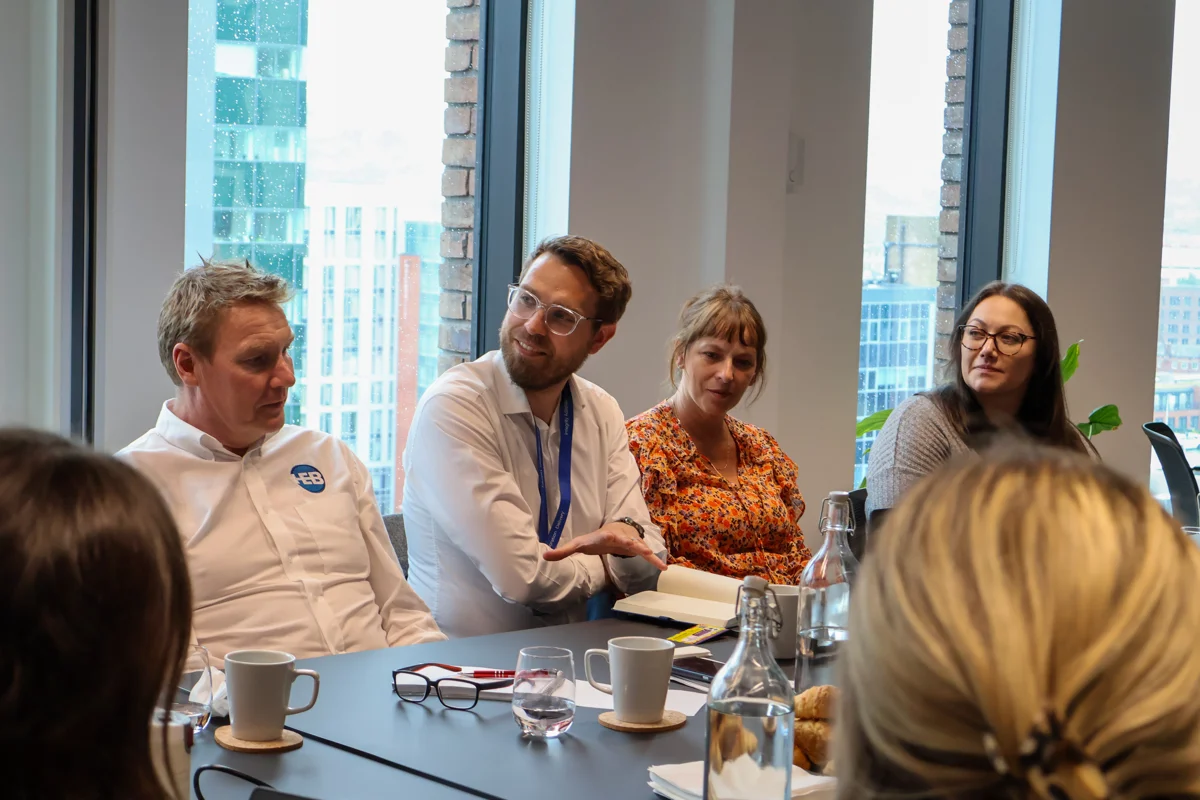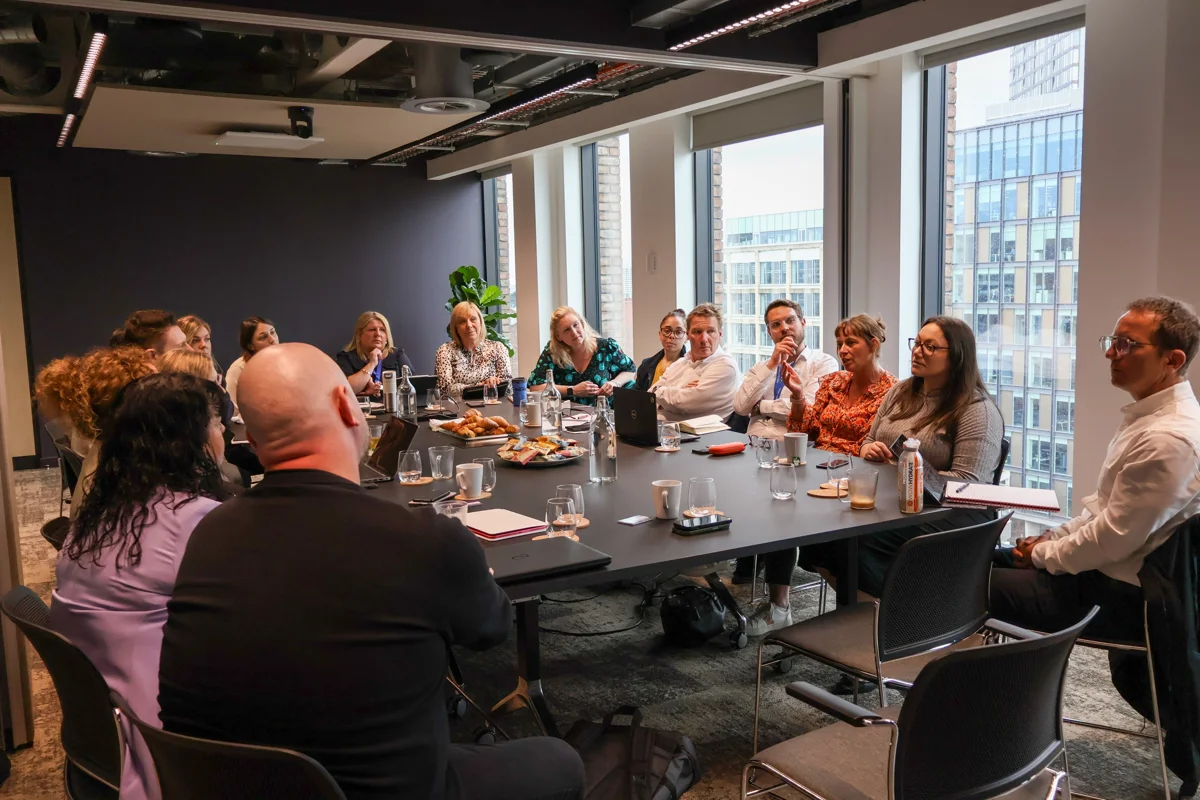On Tuesday 14 May at our Group’s head office in Sheffield, and in collaboration with the Lighthouse Construction Industry Charity, we hosted a roundtable focused on an important topic – Promoting Positive Mental Health in Construction.
We were joined by delegates from across the construction sector, including representatives from the Lighthouse Charity, Banner Plant, Elecomm, Fletchers, H E Barnes, Yates Drywall, HLM Architects, Reynolds and Litchfield, Henry Boot PLC, and HBD.
Together, we shared our thoughts, stories, experiences, and advice, to raise awareness of this subject and explore ways to support individuals who are struggling.
The areas we covered in the roundtable were:
- The state of mental health in the construction industry.
- The challenges facing businesses and their supply chain partners.
- The key opportunities to improve mental health for construction workers.
- The ways the sector can work together to open communication.
- The practical actions from the session that companies can implement.
Mental health in the construction sector
Two representatives from the Lighthouse Charity, Sarah Bolton (CEO) and Tom McConkey, (Head of Partnerships), kicked off the session with some sobering statistics – every day, two construction workers in the UK take their own life, and across the sector, 20% of all sickness is related to stress, anxiety, and depression.
They also revealed how men make up 80% of the industry and how they struggle to speak up because they’ve culturally been taught not to talk about how they feel.
Although a lot of health and safety work has been done on sites, generally there isn’t as much for wellbeing. We’re unpicking decades of it being normal not to open up about feelings and personal struggles. And while our support is for workers in the construction sector, it extends to their families, too. No one should be alone before, during, or after a crisis.
Tom McConkey
However, they both stressed that despite these saddening statistics, the important thing to remember is that there is always hope and there are always solutions. But proactivity is crucial.
It’s vital for businesses to invest in staff and wraparound support services – supporting emotional, physical, and financial wellbeing – as this can help prevent a colleague from reaching a tipping point in the first place.
They highlighted that there is no one-size-fits-all approach when it comes to mental health. Everyone has their preferred way of seeking help. That’s why they have five services – a 24/7 helpline, a text service, a self-support app, #MakeItVisible sites, and a Wellbeing Academy.
They explained that when it comes to businesses looking to improve their mental health support for on-site and off-site employees, contractors and subcontractors, it’s not about donating money. It’s about ensuring help is visible.
It could be included in inductions, ongoing training sessions or intranet portals. It could be specified within job descriptions or on the website. It could be displaying more posters in communal and individual spaces. It could be hosting regular toolbox talks. It could be that a support app is downloaded onto all work phones as standard.
Sharing stories makes it permissible to open up about your own struggles and problems. We need to normalise feelings and discussions around anything that affects our wellbeing.
Sarah BoltonWhat challenges are businesses facing?
One delegate mentioned it was a struggle to get male mental health first aiders in their organisation and this sparked discussion around who the best people for this position are.
It was agreed that it should be someone people are comfortable with. And for construction workers and subcontractors, it’s vital it’s someone who is always on site. The same applies for those in the industry who work from an office. Accessibility and familiarity play key roles in developing a sense of trust.
Another delegate shared how he was the only male mental health first aider in his organisation, and how despite there being five females appointed in the same role, most employees choose to go to him – and most of these workers are male, too.
Someone else also raised the point that it’s easy to feel like you’re never doing enough when it comes to supporting employees with their mental health. Many others agreed, stating that this has led them to being ‘always on’.
Here, Sarah explained that while it’s ok for mental health first aiders to deal with an initial cry for help, signposting is then key. This will get the person seeking help the best long-term support and it will also protect the mental health of those who are listening.
As a mental health first aider, you’re effectively a paramedic, attending to the initial scene, triaging, and transporting the person in need to the specialists who can determine their next-step care pathway to help their recovery. And if you try to solve this yourself, it can be dangerous for both of you.
Sarah BoltonShe stressed that it’s also fundamental for mental health first aiders to have access to support. This is something businesses should take into account when looking to implement a mental health support strategy for employees.

Is a cultural change needed?
After much discussion, it was agreed that a cultural shift is urgently required to ensure we’re effectively addressing mental health in construction and helping to prevent workers reaching a crisis.
It’s not about a few posters. It’s about support being available across different locations and varying mediums.
It’s about collaboration, making changes, and raising awareness of the diverse support touch points that are available.
During this section of the talk, it was also debated that there is still a ‘badge of honour’ among certain generations at being the first in and the last out, whereas other, often younger, demographics are questioning, and recalibrating, their work-life balance.
It was agreed that while this will help the upcoming generations, there is still a more mature subset that will struggle to accept something that conflicts with what they’ve been taught and exposed to throughout their careers. This will take a joined-up and consistent approach from businesses.
What can businesses do to support mental health in construction?
The group then shared some of their own challenges and success stories around approaching mental health in their organisations. The Lighthouse Charity also suggested further actions companies could take. This covered:
- Appointing mental health first aiders.
- Providing mental health first aiders with support and updated training.
- Ensuring these internal champions maintain boundaries and have the right signposting options.
- Being human in your approach to mental health.
- Not asking someone if they’re ok if you don’t have the time to listen.
- Communicating support options before a crisis hits.
- Placing support cards on site.
- Installing support apps on employees' work phones, like the Lighthouse Charity’s Construction Industry Helpline app.
- Sharing key learning points from meetings like these with colleagues.
- Keeping the conversation going and normalising talking.
Sarah shared how ‘unicorns’ are a crucial part of the work The Lighthouse Club does. This refers to the people who are relatable to construction workers – construction workers themselves, sharing their own personal mental health journeys.
People who want to tell their stories on a public stage to help their peers are the silver bullet in our tours across construction sites. These people are hard to find, but they make a massive impact.
Sarah BoltonKey takeaways from the day
Echoing the start of the roundtable, the key takeaway was that there is always hope, but we need to work together to spread the message throughout the construction sector and supply chains.
And while the work the Lighthouse Charity does is being received very positively throughout the industry, there is still more to be done, but it needs to be done collaboratively, if it’s going to make a positive, lasting impact.
If you, or anyone you know, has been affected by this topic and would like to find out more about the Lighthouse Charity, you can visit their website, here: https://www.lighthouseclub.org/
We’d like to say a massive thank you to all the delegates who attended the session and shared their stories and advice. We’re looking forward to continuing working together to raise awareness of the importance of this key topic within the sector.


